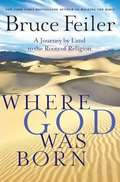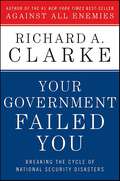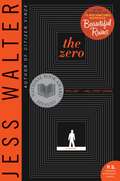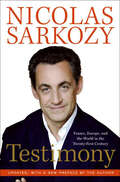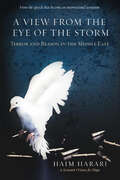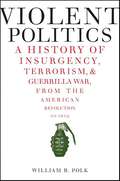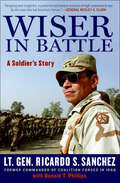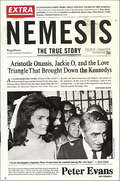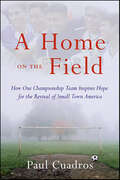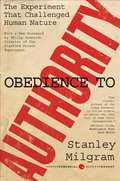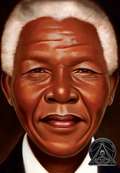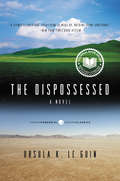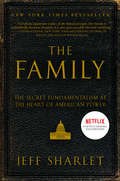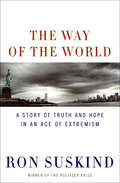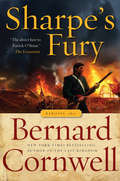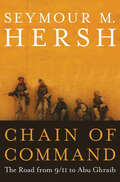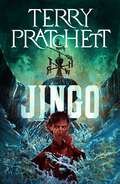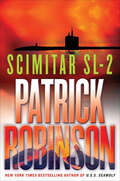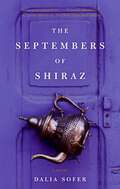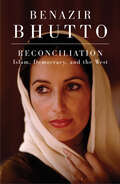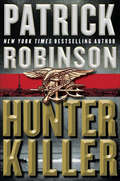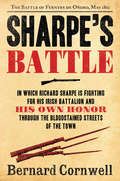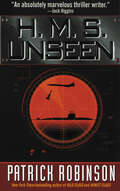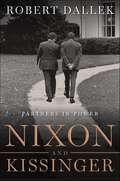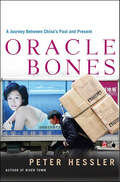- Table View
- List View
Where God Was Born
by Bruce FeilerAt a time when America debates its values and the world braces for religious war, Bruce Feiler, author of the New York Times bestsellers Walking the Bible and Abraham, travels ten thousand miles through the heart of the Middle East--Israel, Iraq, and Iran--and examines the question: Is religion tearing us apart ... or can it bring us together?Where God Was Born combines the adventure of a wartime chronicle, the excitement of an archaeological detective story, and the insight of personal spiritual exploration. Taking readers to biblical sites not seen by Westerners for decades, Feiler's journey uncovers little-known details about the common roots of Judaism, Christianity, and Islam, and affirms the importance of the Bible in today's world.In his intimate, accessible style, Feiler invites readers on a never-in-a-lifetime experience:Israel Feiler takes a perilous helicopter dive over Jerusalem, treks through secret underground tunnels, and locates the spot where David toppled Goliath.Iraq After being airlifted into Baghdad, Feiler visits the Garden of Eden and the birthplace of Abraham, and makes a life-threatening trip to the rivers of Babylon.Iran Feiler explores the home of the Bible's first messiah and uncovers the secret burial place of Queen Esther.In Where God Was Born, Feiler discovers that at the birth of Western religion, all faiths drew from one another and were open to coexistence. Feiler's bold realization is that the Bible argues for interfaith harmony. It cannot be ceded to one side in the debate over values. Feiler urges moderates to take back the Bible and use its powerful voice as a beacon of shared ideals.In his most ambitious work to date, Bruce Feiler has written a brave, uplifting story that stirs the deepest chords of our time. Where God Was Born offers a rare, universal vision of God that can inspire different faiths to an allegiance of hope.
Your Government Failed You: Breaking the Cycle of National Security Disasters
by Richard A. ClarkeRichard Clarke's dramatic statement to the grieving families during the 9/11 Commission hearings touched a raw nerve across America. Not only had our government failed to prevent the 2001 terrorist attacks but it has proven itself, time and again, incapable of handling the majority of our most crucial national-security issues, from Iraq to Katrina and beyond. This is not just a temporary failure of any one administration, Mr. Clarke insists, but rather an endemic problem, the result of a pattern of incompetence that must be understood, confronted, and prevented. In Your Government Failed You, Clarke goes far beyond terrorism to examine the inexcusable chain of recurring U.S. government disasters and strategic blunders in recent years. Drawing on his thirty years in the White House, Pentagon, State Department, and intelligence community, Clarke gives us a privileged, if gravely troubling, look into the debacle of government policies, discovering patterns in the failures and offering ways to halt the catastrophic cycle once and for all.
The Zero: A Novel (P.S.)
by Jess WalterIn this National Book Award Finalist, a cop navigates unexplained memory gaps, a mysterious new assignment, and a world gone mad in the wake of 9/11.Officer Brian Remy has no idea how he got here. It’s been only five days since terrorists attacked his city, and Remy is experiencing gaps in his life—as if he were a stone being skipped across water. He has a self-inflicted gunshot wound that he doesn’t remember inflicting. He has a beautiful new girlfriend whose name he doesn’t know. His son insists on mourning him, despite his being alive. And his old partner now appears on a box of First Responder cereal.While smoke still hangs over the city, Remy is recruited by a shadowy government agency assigned to gather all of the paper that was scattered in the attacks. As Remy stumbles across a dangerous plot, he realizes he must track down the most elusive target of all—himself. And the only way to do that is to return to that place where everything started falling apart.
Testimony: France, Europe, and the World in the Twenty-first Century
by Nicolas SarkozyIn this important book from the newly elected president of France, Nicolas Sarkozy sets forth his personal vision of France's role in world affairs and his plans for modernizing the country and equipping it for the twenty-first century. With unusual candor, President Sarkozy describes the difficulties France has faced in recent years—high unemployment, social tensions, inadequate education, a government that has not been responsive or responsible when confronting economic and social problems. In international relations, he calls for a new approach to the way France positions itself in the world. He is a great admirer of the United States, an unorthodox position for a French leader, and his vision for Europe is ambitious and far-reaching. His iconoclastic views on Israel and the Arab world, Africa, globalization, immigration, and the environment promise a sharp break with the past. The ideas of France's new president are probably more daring, coherent, and compelling than those of any French leader in decades. Furthermore, he remains optimistic about France, insisting that the country is eager to embrace profound change. Bold, pragmatic, a risk-taker, President Sarkozy sets forth an exciting new direction for France as it enters the world of the twenty-first century.
A View from the Eye of the Storm: Terror and Reason in the Middle East
by Haim HarariIn 2004, internationally known physicist Haim Harari was invited to address the advisory board of a major multinational corporation. In a short speech he offered a penetrating analysis of the components of terror, and presented a passionate call for a new era in the Middle East. The speech, entitled "A View from the Eye of the Storm," was not intended for publication, but when a copy was leaked and posted onto the Internet, it caused a worldwide sensation, eventually being translated into more than half a dozen languages. Now—as the modern era of Islamic terror continues to unfold—Harari reaches further, to offer this serious yet accessible survey of the landscape of Middle Eastern war and peace at this challenging crossroads in history.Moving beyond the sterile discourse of foreign affairs journals, Harari encourages the world to view the Middle East through the eyes of a "proverbial taxi driver," a man on the street whose wisdom (and sense of humor) outstrips that of the experts. And, as he observes, to anyone familiar with the Middle East from a taxi driver's perspective, the "persistent ugly storm" engulfing the Arab world is far more than a territorial battle with Israel: It is an "undeclared World War III" that rages from Bali to Madrid, from Nairobi to New York, from Buenos Aires to Istanbul, and from Tunis to Moscow. The sad result is that much of the Arab world has become an "unprecedented breeding ground for cruel dictators, terror networks, fanaticism, incitement, suicide murders, and general decline." And unless the free nations of the world mobilize to stop it, Harari argues, this new world war will continue to cause bloodshed on all continents.As a fifth-generation Israeli-born observer, Harari includes a thorough response to the conventional wisdom about Middle Eastern affairs, including a frank dissection of the media's lopsided portrait of the Arab-Israeli conflict. Drawing on his family's two centuries of life in the Middle East, he offers a compelling catalog of the steps necessary to reach a lasting peace between Israel and the Palestinians—steps, he writes, that are "inevitable—not because everybody accepts them today, but because all sides must accept them before peace can be achieved." And he urges the civilized world to combat terror by isolating its state sponsors, blocking its funding, and promoting education, women's equality, and human rights reform.Eloquent in its simplicity, written with passion, humor, and the directness of a scientist who has spent a lifetime explaining his work to the general public, A View from the Eye of the Storm is that rare book with the power to change hearts and minds.
Violent Politics: A History of Insurgency, Terrorism, & Guerrilla War, from the American Revolution to Iraq
by William R. PolkIn the current Middle East, insurgency tactics are used with frequency and increasing success. But guerrilla war-fare is not just the tool of modern-day terrorists. Its roots stretch back to our very own revolution.In Violent Politics, William Polk takes us on a concise, brilliant tour of insurgencies throughout history, starting with the American struggle for independence, when fighters had to battle against both the British and the loyalists, those colonists who sided with the monarchy. Instinctively, in a way they probably wouldn't have described as a coherent strategy, the rebel groups employed the tactics of insurgency.From there, Polk explores the role of insurgency in several other notable conflicts, including the Spanish guerrilla war against Napoleon, the Irish struggle for independence, the Algerian War of National Independence, and Vietnam. He eventually lands at the present day, where the lessons of this history are needed more than ever as Americans engage in ongoing campaigns in Afghanistan and Iraq—and beyond.
Wiser in Battle: A Soldier's Story
by Donald T. Phillips Ricardo S. SanchezAmidst all of the criticisms of America's war in Iraq, one essential voice has remained silent . . . until now. In his groundbreaking new memoir, Wiser in Battle, LTG (Ret) Ricardo S. Sanchez, former Commander of Coalition Forces in Iraq, reports back from the front lines of the global War on Terror to provide a comprehensive and chilling exploration of America's historic military and foreign policy blunder.
Nemesis: The True Story: Aristotle Onassis, Jackie O, and the Love Triangle That Brought Down the Kennedys
by Peter EvansA veteran journalist uncovers the sensational love triangle between RFK, his brother’s widow, and the Greek Tycoon who plotted his assassination.Bobby Kennedy and Aristotle Onassis, two of the world′s richest and most powerful men, disliked one another from the moment they first met. Over several decades, their mutual animosity only grew, as did their desire to compete for the affections of Jackie, the keeper of the Camelot flame.Now, this shocking work by seasoned investigative journalist Peter Evans reveals the culmination of the Kennedy-Onassis-Kennedy love triangle: Onassis was at the heart of the plot to kill Bobby Kennedy. Nemesis meticulously traces Onassis′s trail—his connections, the way that he financed the assassination—and includes a confession kept secret for three decades. With its deeply nuanced portraits of the major figures and events that shaped an era, Nemesis is a work that will not soon be forgotten.
A Home on the Field: How One Championship Team Inspires Hope for the Revival of Small Town America
by Paul CuadrosA Home on the Field is about faith, loyalty, and trust. It is a parable in the tradition of Stand and Deliver and Hoosiers—a story of one team and their accidental coach who became certain heroes to the whole community.For the past ten years, Siler City, North Carolina, has been at the front lines of immigration in the interior portion of the United States. Like a number of small Southern towns, workers come from traditional Latino enclaves across the United States, as well as from Latin American countries, to work in what is considered the home of industrial-scale poultry processing. At enormous risk, these people have come with the hope of a better life and a chance to realize their portion of the American Dream. But it isn't always easy. Assimilation into the South is fraught with struggles, and in no place is this more poignant than in the schools. When Paul Cuadros packed his bags and moved south to study the impact of the burgeoning Latino community, he encountered a culture clash between the long-time residents and the newcomers that eventually boiled over into an anti-immigrant rally featuring former Klansman David Duke. It became Paul's goal to show the growing numbers of Latino youth that their lives could be more than the cutting line at the poultry plants, that finishing high school and heading to college could be a reality. He needed to find something that the boys could commit to passionately, knowing that devotion to something bigger than them would be the key to helping the boys find where they fit in the world. The answer was soccer. But Siler City, like so many other small rural communities, was a football town, and long-time residents saw soccer as a foreign sport and yet another accommodation to the newcomers. After an uphill battle, the Jets soccer team at Jordan-Matthews High School was born. Suffering setbacks and heartbreak, the majority Latino team, in only three seasons and against all odds, emerged poised to win the state championship.
Obedience to Authority: An Experimental View
by Stanley MilgramThis book presents Milgram's fascinating and troubling chronicle of his classic study and a vivid and persuasive explanation of his conclusions.
Nelson Mandela
by Kadir NelsonThis stunning picture book biography of Nelson Mandela by Kadir Nelson is a receipient of the Coretta Scott King Honor award. In this picture book biography, award-winning author and illustrator Kadir Nelson tells the story of Mandela, a global icon, in poignant free verse and glorious illustrations. It is the story of a young boy's determination to change South Africa, and of the struggles of a man who eventually became the president of his country by believing in equality for all people, no matter the color of their skin. Readers will be inspired by Mandela's triumph and his lifelong quest to create a more just world. An author's note at the back retells the story of Mandela's fight against apartheid in simple prose, and takes the story further, including Mandela's Nobel Peace Prize. A short bibliography lists additional sources for readers who want to find out more.
The Dispossessed: A Novel (Hainish Cycle)
by Ursula K. Le GuinOne of The Atlantic’s Great American Novels“One of the greats. . . . Not just a science fiction writer; a literary icon.” —Stephen King“Engrossing . . . Ursula Le Guin is more than just a writer of adult fantasy and science fiction . . . she is a philosopher; an explorer in the landscapes of the mind.” — Cincinnati EnquirerUrsula K. Le Guin’s Hugo, Locus, and Nebula Award–winning classic, a profound and thoughtful tale of anarchism and capitalism, individualism and collectivism, and one ambitious man’s quest to bridge the ideological chasm separating two worlds. The Dispossessed is the spellbinding story of anarchist Shevek, the “galactically famous scientist,” who single-handedly attempts to reunite two planets cut off from each other by centuries of distrust.Anarres, Shevek’s homeland, is a bleak moon settled by an anarchic utopian civilization, where there is no government, and everyone, at least nominally, is a revolutionary. It has long been isolated from other worlds, including its mother planet, Urras—defined by warring nations, great poverty, and immense wealth. Now Shevek, a brilliant physicist, is determined to unify the two civilizations. In the face of great hostility, outright threats, and the pain of separation from his family, he makes an unprecedented trip to Urras. Greater than any concern for his own wellbeing is the belief that the walls of hatred, distrust, and philosophic division between his planet and the rest of the civilized universe must be torn down. He will seek answers, question the unquestionable, and explore differences in customs and cultures, determined to tear down the walls of hatred that have kept them apart.To visit Urras—to learn, to teach, to share—will require great sacrifice and risks, which Shevek willingly accepts. Almost immediately upon his arrival, he finds not the egotistical philistines he expected, but an intelligent, complex people who warmly welcome him. But soon the ambitious scientist and his gift is seen as a threat, and in the profound conflict that ensues, he must reexamine his beliefs even as he ignites the fires of change.
The Family: The Secret Fundamentalism at the Heart of American Power
by Jeff SharletThey insist they are just a group of friends, yet they funnel millions of dollars through tax-free corporations. They claim to disdain politics, but congressmen of both parties describe them as the most influential religious organization in Washington. They say they are not Christians, but simply believers. Behind the scenes at every National Prayer Breakfast since 1953 has been the Family, an elite network dedicated to a religion of power for the powerful. Their goal is "Jesus plus nothing." Their method is backroom diplomacy. The Family is the startling story of how their faith-part free-market fundamentalism, part imperial ambition-has come to be interwoven with the affairs of nations around the world.
The Way of the World: A Story of Truth and Hope in an Age of Extremism
by Ron SuskindFrom Pulitzer Prize–winning journalist and bestselling author Ron Suskind comes a startling look at how America lost its way and at the nation's struggle, day by day, to reclaim the moral authority upon which its survival depends. From the White House to Downing Street, from the fault-line countries of South Asia to the sands of Guantánamo, Suskind offers an astonishing story that connects world leaders to the forces waging today's shadow wars and to the next generation of global citizens. Tracking down truth and hope within the Beltway and far beyond it, Suskind delivers historic disclosures with this emotionally stirring and strikingly original portrait of the post-9/11 world.In a sweeping, propulsive, and multilayered narrative, The Way of the World investigates how America relinquished the moral leadership it now desperately needs to fight the real threat of our era: a nuclear weapon in the hands of terrorists. Truth, justice, and accountability become more than mere words in this story. Suskind shows where the most neglected dangers lie in the story of "The Armageddon Test" —a desperate gamble to send undercover teams into the world's nuclear black market to frustrate the efforts of terrorists trying to procure weapons-grade uranium. In the end, he finally reveals for the first time the explosive falsehood underlying the Iraq War and the entire Bush presidency.While the public and political realms struggle, The Way of the World simultaneously follows an ensemble of characters in America and abroad who are turning fear and frustration into a desperate—and often daring—brand of human salvation. They include a striving, twenty-four-year-old Pakistani émigré, a fearless UN refugee commissioner, an Afghan teenager, a Holocaust survivor's son, and Benazir Bhutto, who discovers, days before her death, how she's been abandoned by the United States at her moment of greatest need. They are all testing American values at a time of peril, and discovering solutions—human solutions—to so much that has gone wrong.For anyone hoping to exercise truly informed consent and begin the process of restoring the values and hope—along with the moral clarity and earned optimism—at the heart of the American tradition, The Way of the World is a must-read.
Sharpe's Fury: Richard Sharpe and the Battle of Barrosa, March 1811 (Sharpe #11)
by Bernard CornwellFrom New York Times bestselling author Bernard Cornwell, the eleventh installment in the world-renowned Sharpe series, chronicling the rise of Richard Sharpe, a Private in His Majesty’s Army at the siege of Seringapatam. In the winter of 1811, the war seems lost. Spain has fallen to the French, except for Cadiz, now the Spanish capital and itself under siege. Inside the city walls an intricate diplomatic dance is taking place and Richard Sharpe faces more than one enemy.The small British force is trapped by a French army, and their only hope lies with the outnumbered redcoats outside refusing to admit defeat. There, in the sweltering horror of Barrosa, Sharpe will meet his old enemy Colonel Vandal once again.
Chain of Command: The Road from 9/11 to Abu Ghraib
by Seymour M. HershA Pulitzer Prize–winning journalist examines how America’s war on terror led from the September 11th attacks to a war in Iraq.Since September 11, 2001, Seymour M. Hersh has riveted readers—and outraged the Bush Administration—with his explosive stories in The New Yorker, including his headline-making pieces on the abuse of prisoners at Abu Ghraib. Now, Hersh brings together what he has learned, along with new reporting, to answer the critical question of the last four years: How did America get from the clear morning when two planes crashed into the World Trade Center to a divisive and dirty war in Iraq?In Chain of Command, Hersh takes an unflinching look behind the public story of the war on terror and into the lies and obsessions that led America into Iraq. Hersh draws on sources at the highest levels of the American government and intelligence community, in foreign capitals, and on the battlefield for an unparalleled view of a critical chapter in America's recent history. In a new afterword, he critiques the government’s failure to adequately investigate prisoner abuse—at Abu Ghraib and elsewhere—and punish those responsible. With an introduction by The New Yorker’s editor, David Remnick, Chain of Command is a devastating portrait of an administration blinded by ideology and of a president whose decisions have made the world a more dangerous place for America.
Jingo: A Discworld Novel (City Watch #4)
by Terry Pratchett“Pratchett’s writing is a constant delight. No one mixes the fantastical and the mundane to better comic effect or offers sharper insights into the absurdities of human endeavor.” —Daily MailCommander Sam Vines, the Ankh-Morpork City Watch, and their compatriots must fight for their country (or something like that) when Discworld goes to war in this wickedly funny Discworld novel from New York Times bestselling author Terry Pratchett.No one would dream of starting a war without a perfectly good reason . . . such as a “strategic” piece of old rock in the middle of nowhere known as Leshp. It isn’t much of an island that rises up one moonless night from the depths of the Circle Sea—just a few square miles of silt and some old ruins. Unfortunately, this historically disputed lump of earth is once again floating directly between two proud lands, Ankh-Morpork and the city of Al-Khali on the coast of Klatch. And that’s enough to ignite the inglorious international pastime known as “war.”It is, after all, every citizen’s right to bear arms to defend their own. Even if it isn’t technically their own. And even if they don’t have much in the way of actual weaponry. Pressed into patriotic service, Commander Sam Vimes thinks he should be leading his loyal watchmen, female watchdwarf, and lady werewolf into battle against local malefactors rather than against Klatchians. But war is, after all, simply the greatest of all crimes—and it’s Sir Samuel’s sworn duty to seek out criminal masterminds wherever they may be hiding . . . and lock them away.As two armies march, Vimes faces unpleasant foes who are out to get him . . . and that’s just the people on his side. The enemy might be even worse.The Discworld novels can be read in any order but Jingo is the 4th book in the City Watch collection and the 21st Discworld book.The City Watch series in order:Guards! Guards!Men at ArmsFeet of ClayJingoThe Fifth ElephantNight WatchThud!Snuff
Scimitar SL-2 (Arnold Morgan #7)
by Patrick RobinsonTerrorists aim to create a mega-tsunami with a nuclear missile in this military thriller by the New York Times–bestselling author of Barracuda 945.Amid the Canary Islands lies the massive crater of the volcano Cumbre Vieja. Scientists theorize that one day the volcano will erupt, triggering a series of events that will lead to a tsunami higher than any in recorded history. This mega-tsunami, with waves of more than 150 feet in height, would ravage Europe, Africa, and ultimately the East Coast of the United States, causing immeasurable loss of life and destruction . . . After Professor Paul Landon, the world’s most prominent geophysicist, is found with a bullet in his head, it is discovered that Ravi Rashood—America’s nemesis and the former SAS officer who is now the head of Hamas—has hatched a diabolical plot against the West: to fire a nuclear-tipped guided cruise missile—Scimitar SL-2, named for the curved sword of the Muslim warrior Saladin—into Cumbre Vieja.U.S. Admiral Arnold Morgan, the retired National Security Adviser, and the Pentagon know it’s not a joke when Rashood, accompanied once again by his wife, the Palestinian Shakira, explodes Mount St. Helens. Morgan knows something even more horrific is to come. But stopping them won’t be easy.Rashood and his Hamas crew are deep in the ocean, in an undetectable sub, which he managed to procure from Russia via communist China. Perhaps worse, a new president, a weak-willed liberal in the White House, worries about taking a stand. As the terrorists’ deadline approaches, the newly implemented and unseasoned National Security team must consider the unthinkable. They must assume the daunting task of organizing a mass relocation of major population centers along the East Coast to safer ground.Morgan once again finds himself at the center of a desperate cat-and-mouse chase, battling his greatest enemy yet as he races against time to locate the silent underwater marauder and stop Rashood before the unimaginable happens . . . With his trademark authentic research and grasp of military hardware, geopolitics, and cutting-edge science, Patrick Robinson is at the top of his game with this tale.Praise for Scimitar S-2“What Robinson does do . . . is tell a great story, and tell it well, and scare the living vinegar out of you along the way. . . . Scimitar S-2may well be the most frightening book you will read all year.” —Bookreporter.com
The Septembers of Shiraz: A Novel
by Dalia SoferIn the aftermath of the Iranian revolution, rare-gem dealer Isaac Amin is arrested, wrongly accused of being a spy. Terrified by his disappearance, his family must reconcile a new world of cruelty and chaos with the collapse of everything they have known. As Isaac navigates the tedium and terrors of prison, forging tenuous trusts, his wife feverishly searches for him, suspecting, all the while, that their once-trusted housekeeper has turned on them and is now acting as an informer. And as his daughter, in a childlike attempt to stop the wave of baseless arrests, engages in illicit activities, his son, sent to New York before the rise of the Ayatollahs, struggles to find happiness even as he realizes that his family may soon be forced to embark on a journey of incalculable danger.A page-turning literary debut, The Septembers of Shiraz simmers with questions of identity, alienation, and love, not simply for a spouse or a child, but for all the intangible sights and smells of the place we call home.
Reconciliation: Islam, Democracy, and the West
by Benazir BhuttoBenazir Bhutto returned to Pakistan in October 2007, after eight years of exile, hopeful that she could be a catalyst for change. Upon a tumultuous reception, she survived a suicide-bomb attack that killed nearly two hundred of her countrymen. But she continued to forge ahead, with more courage and conviction than ever, since she knew that time was running out—for the future of her nation, and for her life.In Reconciliation, Bhutto recounts in gripping detail her final months in Pakistan and offers a bold new agenda for how to stem the tide of Islamic radicalism and to rediscover the values of tolerance and justice that lie at the heart of her religion. With extremist Islam on the rise throughout the world, the peaceful, pluralistic message of Islam has been exploited and manipulated by fanatics. Bhutto persuasively argues that America and Britain are fueling this turn toward radicalization by supporting groups that serve only short-term interests. She believed that by enabling dictators, the West was actually contributing to the frustration and extremism that lead to terrorism. With her experience governing Pakistan and living and studying in the West, Benazir Bhutto was versed in the complexities of the conflict from both sides. She was a renaissance woman who offered a way out.In this riveting and deeply insightful book, Bhutto explores the complicated history between the Middle East and the West. She traces the roots of international terrorism across the world, including American support for Pakistani general Zia-ul-Haq, who destroyed political parties, eliminated an independent judiciary, marginalized NGOs, suspended the protection of human rights, and aligned Pakistani intelligence agencies with the most radical elements of the Afghan mujahideen. She speaks out not just to the West, but to the Muslims across the globe who are at a crossroads between the past and the future, between education and ignorance, between peace and terrorism, and between dictatorship and democracy. Democracy and Islam are not incompatible, and the clash between Islam and the West is not inevitable. Bhutto presents an image of modern Islam that defies the negative caricatures often seen in the West. After reading this book, it will become even clearer what the world has lost by her assassination.
Hunter Killer (Arnold Morgan #8)
by Patrick RobinsonAmerican military forces race to prevent a coup in the Middle East in this thriller by the New York Times–bestselling author of Scimitar SL-2.Saudi Arabia, the world’s leading producer of oil, is on the brink of revolution. Inside the opulent palaces and lavish mansions, the royal family is ransacking the country’s dwindling coffers while the desert kingdom seethes with unrest. Appalled at his family’s extravagant lifestyle, Crown Prince Nasir vows to end the careless and destructive rule, and sets in motion a top-secret operation to destroy the Saudi oil industry and bankrupt the monarch. To do so, he must enlist the help of an ally, a naval power willing to help in return for a share of the wealth.Nasir turns to France, with its lethal Hunter Killer submarines, capable of inflicting devastating damage on the massive oil installations along the shores of the Red Sea and in the Persian Gulf. Objective: To shift the power structure of the world’s oil giant.Under the command of the mysterious and lethally effective Colonel Jacques Gamoudi—nicknamed “Le Chasseur,” or “The Hunter—the ferocious battle for the desert kingdom begins. As the world’s oil markets plunge into chaos, United States Admiral Arnold Morgan, former Security Adviser to the President, and Lieutenant Commander Jimmy Ramshawe are summonded to the White House, where they learn that Gamoudi has been joined by none other than Morgan’s archenemy, Hamas General Ravi Rashood, in the battle for the capital city of Riyadh.Now Le Chasseur becomes the hunted, by both French and American Special Forces—one trying to assassinate and silence him forever, the other desperate to take him alive and to force a public confession of France’s subversive actions.Praise for Patrick Robinson“An absolutely marvelous thriller writer.” —Jack Higgins“The new Frederick Forsyth.” —Guardian“Patrick Robinson is quickly replacing Tom Clancy as the preeminent writer of modern naval fiction.” —Florida Times-Union“One of the crown princes of the beach read-thriller.” —Stephen Coonts
Sharpe's Battle: The Battle of Fuentes de Onoro, May 1811 (Sharpe #12)
by Bernard CornwellFrom New York Times bestselling author Bernard Cornwell, the twelth installment in the world-renowned Sharpe series, chronicling the rise of Richard Sharpe, a Private in His Majesty’s Army at the siege of Seringapatam. Quartered in a crumbling Portuguese fort, Richard Sharpe and his men are attacked by an elite French unit, led by an old enemy of Sharpe’s, and suffer heavy losses.The army’s high command blame Sharpe for the disaster and his military career seems to be ruined. His only hope is to redeem himself on the battlefield. So with his honour at stake, against an overwhelming number of French troops, Sharpe leads his men to battle in the narrow streets of Fuentes de Oñoro.
H.M.S. Unseen (Arnold Morgan #3)
by Patrick RobinsonThe H.M.S. Unseen is one of the most efficient, lethal submarines ever built. But suddenly, on a training mission off the English coast, it vanishes, baffling military intelligence on both sides of the Atlantic, including National Security Adviser Admiral Arnold Morgan. A missing weapon is dangerous enough. But then the unthinkable begins to happen... Planes begin blowing up across the skies.Searching for answers, Morgan is convinced that only one man can be behind all these devastating events: his archenemy, the world's most cunning—yet reportedly dead—terrorist spy. Determined to stop his old nemesis, Morgan must use all his wits to find a madman armed with a powerful sub hidden somewhere in a million square miles of ocean. What Morgan doesn't know, however, is that the fanatical terrorist has a plan of his own, one that will bring these two intense warriors face-to-face—and only one will come out alive in one of the most chilling spy stories of the year.
Nixon and Kissinger: Partners in Power
by Robert DallekThe renowned scholar’s epic dual biography of the 37th president and his powerful secretary of state: “A classic work of contemporary American history” (The Los Angeles Times).Working side by side in the White House, Richard Nixon and Henry Kissinger were two of the most compelling, contradictory, and powerful figures in the second half of the twentieth century. While their personalities could hardly have seemed more different, both were largely self-made men, brimming with ambition, driven by their own inner demons, and often ruthless in pursuit of their goals.Tapping into a wealth of recently declassified archives, Robert Dallek uncovers fascinating details about Nixon and Kissinger’s tumultuous personal relationship and brilliantly analyzes their shared roles in monumental historical events—including the nightmare of Vietnam, the unprecedented opening to China, détente with the Soviet Union, the Yom Kippur War in the Middle East, the disastrous overthrow of Allende in Chile, and the scandal of Watergate.
Oracle Bones: A Journey Through Time in China
by Peter HesslerA century ago, outsiders saw China as a place where nothing ever changes. Today the country has become one of the most dynamic regions on earth. In Oracle Bones, Peter Hessler explores the human side of China's transformation, viewing modern-day China and its growing links to the Western world through the lives of a handful of ordinary people. In a narrative that gracefully moves between the ancient and the present, the East and the West, Hessler captures the soul of a country that is undergoing a momentous change before our eyes.
